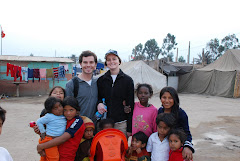It has been brought to my attention that there is some due contextualization for some of my words thus put forward. When I say, "my words" it should not be too difficult to ascertain the identity of which writer belongs to which entry. (Actually, we were joking about that the other day but we both agree that this is a nice compliment that Rylee might catalogue all the experiences that we are having as they candidly occur and that I chime in about some of these other issues and vice versa to be sure.) Some things I wish to add to the account concerning Job, suffering and war; some important things. For example, there are two important factors about Job's overall story that are quite relevant to understanding the presence of human suffering. For one thing, the story opens with what kind of suffering Yahweh might permit in the life of Job- a point that does not rest well with pretty much any of us-believer or not. In other words, the question that we often face: why on earth would God allow evil things to happen (e.g. immense suffering and war)? And one of the conclusions that we come to in the midst of this question is that we cannot comprehend the whys or hows and yet we still believe that HE is omnipotent and wholly good-one simple yet profound definition of what faith is. However, just because we conclude that our minds are too small to understand does not mean that our hearts are too small to sympathize. (When I use the word sympathy, I mean the literal translation, which is 'to suffer with another'.) Additionally, while I cannot necessarily understand the paradox of why God allows us to carry on in this way I can, I think, understand some of the reasons that man chooses to wage war and these points are the the ones that I wish to seek out and question very intentionally through some posts on the blog especially to our Christian brothers and sisters. For me and for this particular discourse, to revisit Nouwen's Reaching Out is quite helpful for direction,
"Maybe, for the time being, we have to accept the many fluctuations between knowing and not knowing, seeing and not seeing, feeling and not feeling, between days in which our hearts seem tied to a millstone, between moments of ecstatic joy and moments of gloomy depression, between the humble confession that the newspaper holds more than our souls can bear and the realization that it is only through facing up to the reality of our world that we can grow into our own responsibility."I would like to have Nouwen explain away this entire concept but alas his own instruction suggests that we search our innermost selves in order to live the questions.
That is what I have committed to do for our time here in Sri Lanka and it is what I am committed to do for the rest of my life: live the questions. I will risk vulnerability, irrelevancy and uncertainty if it means that my fellow brothers and sisters might begin to live the questions themselves; the, "questions about why we live and love, work and die" and the question of suffering-that will not soon escape my own heart. And I can say that as I find myself presently pondering this question, I am neither cast into a severe bitterness about those who wage war or inflict pain nor am I subdued by a false sense of contentment that there is nothing we can do to affect the great sufferings of others. That is the difference in my question about suffering: I am not suggesting that you search your hearts with the intention of solving the problem of evil (for that task is left for HIM alone) rather what I am asking of us all is to consider what role we are playing in coming alongside our fellow image bearers.
Perhaps something else that I want to accomplish through this post is to say: some of the things that I write about will come across as outspoken; some of the things will not sit well with you at first or at all; some of the things might seem politically polarized but I can assure you that all of the things that I write about will be thoroughly thought through. The things that I write about are coming from a sincere passion to share and to share in an honest, real and forthright manner. In another way, I am trying to empty myself in order that I might be filled through this service; I am trying to empty my heart and my mind in order that I might experience an internal poverty that is open and willing to be fed and filled once again. I want to become like the so many coconut skins that we have come across-lying there cracked and open, empty and broken, and yet still useful in some way or another. Part of this experience is what Nouwen calls the 'solitude of heart' and so just as I began with the words of Henri Nouwen, I cannot help but finish with his words simply because they appear to make sense of these issues with such acute articulation,
"In the solitude of the heart we can truly listen to the pains of the world because there we can recognize them not as strange and unfamiliar pains, but as pains that are indeed our own. There we can see that what is most universal is most personal and that indeed nothing human is strange to us. There we can feel that the cruel reality of history is indeed the reality of the human heart, our own included, and that to protest asks, first of all, for a confession of our own participation in the human condition."


No comments:
Post a Comment